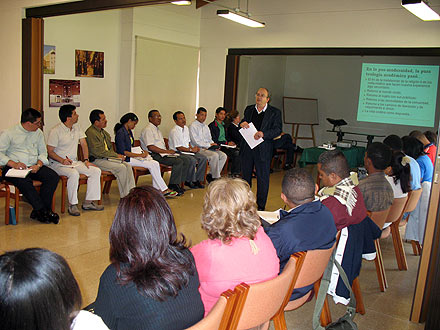
The organizational centre of IFES is in Oxford, England. Dr. Daniel Bourdanné is the current General Secretary, Femi Adeleye and Gideon Yung are the Associate General Secretaries. Dr. Bourdanné was installed as General Secretary at the IFES World Assembly on 17 July 2007. Previously he served as Regional Secretary for Francophone Africa. Other General Secretaries have been Australian C. Stacey Woods (1947–1972), Singaporean Chua Wee Hian (1972–1991) and Welshman Lindsay Brown (1991–2007). But the heart of the movement are the thousands of students, volunteers and staff who faithfully and sacrificially contribute in their local settings, but will never be recognised or eulogised.
This movement encourages interdenominational evangelism in all its member movements. At the 2007 World Assembly, six strategic priorities were re-affirmed: Evangelism & Mission, Global Partnership, Leadership Development & Formación (a Spanish word which means well-rounded development), Governance of IFES & National Movements, Integral Approach to Ministry and Fund Development. For the quadrennium 2007-2011, the prioritisation and application of these six strategic priorities are still being considered as leadership interprets the results from the World Assembly discussions. In addition, the IFES's historic emphases on inductive Bible study, small groups and "the discipleship of the mind", which is evidence of a strong commitment to discipleship, will continue.
Evangelicalism
Evangelicalism is a Protestant Christian movement which began in Great Britain in the 1730s and gained popularity in the United States during the series of Great Awakenings of the 18th and 19th century.
Its key commitments are:
The need for personal conversion (or being "born again");
A high regard for biblical authority;
An emphasis on teachings that proclaim the saving death and resurrection of the Son of God, Jesus Christ;
Actively expressing and sharing the gospel.
David Bebbington has termed these four distinctive aspects conversionism, biblicism, crucicentrism, and activism noting, "Together they form a quadrilateral of priorities that is the basis of Evangelicalism."
Christianity
Christianity (from the Ancient Greek word Χριστός, Khristos, "Christ", literally "anointed one") is a monotheistic religion based on the life and teachings of Jesus as presented in canonical gospels and other New Testament writings.Adherents of the Christian faith are known as Christians.
Christianity teaches that Jesus is the Son of God, God having become human and the saviour of humanity. Because of this, Christians commonly refer to Jesus as Christ or Messiah. The three largest groups in the world of Christianity are the Roman Catholic Church, the Eastern Orthodox churches, and the various denominations of Protestantism. The Roman Catholic and Eastern Orthodox patriarchates split from one another in the East–West Schism of 1054 AD, and Protestantism came into existence during the Protestant Reformation of the 16th century, splitting from the Roman Catholic Church.
Christianity began as a Jewish sect in the mid-1st century. Originating in the eastern Mediterranean coast of the Middle East (modern Israel and Palestine), it quickly spread to Syria, Mesopotamia, Asia Minor and Egypt, it grew in size and influence over a few decades, and by the 4th century had become the dominant religion within the Roman Empire. During the Middle Ages, most of the remainder of Europe was Christianized, with Christians also being a sometimes large religious minority in the Middle East, North Africa, Ethiopia[9] and parts of India. Following the Age of Discovery, through missionary work and colonization, Christianity spread to the Americas, Australasia, sub Saharan Africa and the rest of the world. In order to follow Jesus' command to serve others, Christians established hospitals, churches, schools, charities, orphanages, homeless shelters, and universities in the areas in which they spread Christianity.
Christians believe that Jesus is the Messiah prophesied in the Hebrew Bible, referred to as the "Old Testament" in Christianity. The foundation of Christian theology is expressed in the early Christian ecumenical creeds which contain claims predominantly accepted by followers of the Christian faith. These professions state that Jesus suffered, died, was buried, and was resurrected from the dead to open heaven to those who believe in him and trust him for the remission of their sins (salvation). They further maintain that Jesus bodily ascended into heaven where he rules and reigns with God the Father. Most denominations teach that Jesus will return to judge all humans, living and dead, and grant eternal life to his followers. He is considered the model of a virtuous life, and both the revealer and physical incarnation of God. Christians call the message of Jesus Christ the Gospel ("good news") and hence refer to the earliest written accounts of his ministry as gospels.
As of the early 21st century, Christianity has approximately 2.2 billion adherents. Christianity represents about a quarter to a third of the world's population and is the world's largest religion. Christianity is the state religion of several countries. Among all Christians, 37.5% live in the Americas (11.4% in the United States), 25.7% live in Europe, 22.5% live in Africa, 13.1% live in Asia, 1.2% live in Oceania and 0.9% live in the Middle East.
Evangelism
Evangelism refers to the practice of relaying information about a particular set of beliefs to others who do not hold those beliefs. The term is often used in reference to Christianity.
Christians who specialize in evangelism are known as evangelists whether they are in their home communities or living as missionaries in the field. Some Christian traditions consider evangelists to be in a leadership position; they may be found preaching to large meetings or in governance roles. Christian groups who actively encourage evangelism are sometimes known as evangelistic or evangelist. The scriptures do not use the word evangelism, but evangelist is used in Acts 21:8, Ephesians 4:11, and 2 Timothy 4:5.
The communication of Christian faith to new geographical areas and cultures is often referred to as evangelization, or specifically, world evangelization.
FIX Emperor King of Holy Columbian Roman Empire
In 2011 after the Papal visit, what now?
No comments:
Post a Comment